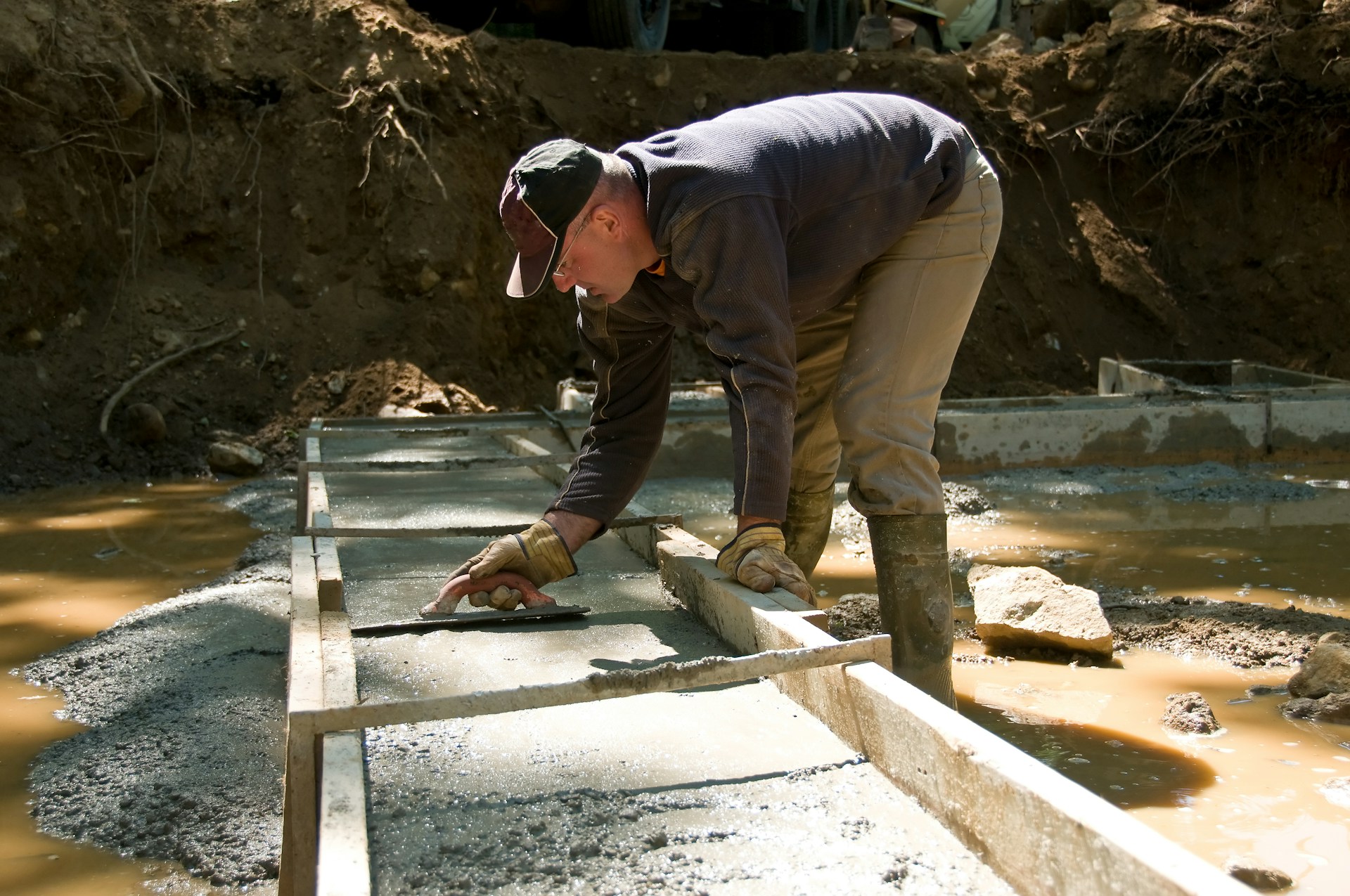Have you been searching for “foundation stabilization near me” because of cracks in your walls, sloping floors, or other worrying signs at home?
In Florida, shifting soils, heavy rains, and even sinkholes can create hidden problems that threaten your home’s safety.
Foundation stabilization isn’t just about quick fixes; it’s about strengthening the ground beneath your property so your home stays stable and secure for years to come. Choosing trusted local experts makes all the difference. Helicon has served Florida homeowners since 2004, offering proven, long-term solutions designed for our unique soil conditions.
The truth is, foundation issues rarely get better on their own. What starts as a small crack or slightly uneven floor can quickly grow into a costly repair if ignored. Acting early with professional stabilization not only protects your home, but it also protects your peace of mind.
In this blog, you will learn:
- What foundation stabilization is and why it’s essential in Florida
- The common warning signs that your home may need professional help
- The different stabilization methods and how Helicon tailors them to your needs
Let’s dive in!
Understanding Foundation Stabilization
Foundation stabilization keeps your home safe by fixing weak soil and preventing damage. Problems often start underground, but you can spot warning signs early. Knowing what causes foundation issues and how to recognize them helps protect your property.
What Is Foundation Stabilization?
Foundation stabilization means strengthening the soil under your home. This prevents the ground from shifting or sinking, which can crack your foundation. Common methods include adding helical piers or improving soil with special compounds.
Stabilizing your foundation keeps walls straight and floors level. This is especially important in places like Florida, where soft or sandy soil can cause extra movement.
Common Causes of Foundation Problems
Several things can weaken your foundation over time:
- Poor soil quality, like loose sand or clay
- Changes in moisture from heavy rain or drought
- Tree roots growing near the foundation
- Plumbing leaks underground
- Nearby construction causing vibrations
Soil issues and sinkholes are common causes of foundation damage in Florida. Your foundation can crack or settle unevenly when the ground moves or washes away. Knowing the causes lets you act before serious damage happens.
Warning Signs Your Foundation Needs Stabilization
Look out for these signs that your foundation may need help:
- Cracks in walls, especially near windows or doors
- Doors and windows that stick or won’t close properly
- Sloping or uneven floors
- Gaps between walls and floors or ceilings
- Bowing walls or cracks in concrete slabs
If you notice any of these, get a professional inspection. Early action can save you from costly repairs later.
Types of Foundation Stabilization Solutions
When your home’s foundation shows signs of settling or damage, several methods can fix and stabilize it. These solutions depend on the specific problem, but all aim to stop movement and restore strength. Some rely on deep supports, others on lifting slabs or improving soil quality.
Piering and Underpinning Options
Piering uses strong steel or concrete posts driven deep into the ground to support your home’s foundation. This method works best when the soil near the surface is weak, but stronger soil lies deeper.
Underpinning adds extra support under your foundation to spread the load evenly. It often uses concrete or steel piers placed beneath footings.
Benefits include:
- Long-term stability
- Protection against sinking
- Suitable for heavy structural shifts
Slabjacking and Mudjacking Techniques
Slabjacking lifts sunken concrete slabs by pumping a material underneath.
Mudjacking uses a cement mixture, while slabjacking can use polyurethane foam. This method works well when concrete driveways, sidewalks, or patios sink, but the foundation is sound. It fills voids and raises the concrete back to its original level.
Key points:
- Non-invasive and cost-effective
- Quick to apply with minimal disruption
- Lasts longer with modern foam materials
Slabjacking restores even surfaces fast, improving safety and appearance without heavy construction.
Soil Stabilization Methods
Sometimes foundation problems start with weak or shifting soil. Soil stabilization strengthens the ground beneath your home. This can involve mixing in chemicals or compacting the soil to reduce movement.
Common techniques include:
- Chemical grouting to solidify loose soil
- Mechanical compaction to increase density
- Adding lime or cement to improve soil strength
Improving the soil reduces risks from sinkholes or erosion. Soil stabilization is essential in areas with naturally soft or wet soil, like much of Florida. Helicon offers expert soil work to support safe construction and foundation repairs.
Comparing Foundation Stabilization Methods and Their Best Uses
With so many foundation stabilization methods available, it can be difficult to know which one is right for your home. Each approach has specific strengths depending on soil conditions, severity of the problem, and long-term needs.
Here’s a quick comparison to help you understand the differences:
| Method | Best For | How It Works | Benefits | Offered by Helicon |
| Helical Piers | Light structures, additions, sandy or weak soils | Steel shafts screwed deep into stable layers for strong anchoring | Long-term stability, precise installation, works in weak soils | ✅ Yes |
| Push Piers | Heavy homes, deep settlement | Steel piers driven into load-bearing soil using hydraulic pressure | Strong support, lifts settled foundations, permanent fix | ✅ Yes |
| Slabjacking (Foam Injection) | Sunken slabs like driveways, patios, pool decks | Polyurethane foam injected beneath slab to lift and fill voids | Fast, non-invasive, minimal disruption, long-lasting | ✅ Yes |
| Compaction Grouting | Sinkhole-prone or loose soils | Thick grout pumped underground to densify and stabilize soil | Prevents collapse, improves weak soil, ideal for sinkhole areas | ✅ Yes |
| Chemical Soil Stabilization | Clay or moisture-sensitive soils | Chemical agents injected to strengthen soil and reduce movement | Prevents shifting, protects against erosion, long-term soil improvement | ✅ Yes |
Our free inspections ensure the right method is chosen for your specific soil and foundation type, so you never pay for unnecessary work and get results that last.
Choosing the Right Foundation Stabilization Contractor
Finding the right contractor means focusing on local experience, clear communication, and proper credentials. You want someone who understands your area’s soil conditions and has a proven record of quality work. Asking the right questions and ensuring proper licensing protects your investment and peace of mind.
What to Look for in Local Experts?
Finding the right contractor for foundation stabilization means looking beyond just price. Here are the qualities that truly matter when choosing trusted local experts:
- Specialization in Foundation Stabilization: Choose contractors who focus specifically on stabilization work, not just general construction. Specialized knowledge ensures they understand the unique challenges of soil movement and structural repair.
- Experience with Local Soil Conditions: Florida’s soils, sand, clay, and even sinkhole-prone limestone, require tailored solutions. Local experts know how these conditions affect foundations and can apply the right methods from the start.
- Proven Track Record: Look for companies with a history of successful projects, backed by strong customer reviews and testimonials. This shows consistency, reliability, and real-world experience.
- Range of Solutions Offered: Contractors should provide options like helical piers, push piers, or soil compaction. A wide service range means they can recommend the solution that truly fits your property’s needs.
- Trusted Local Reputation: A company like Helicon, with many years of experience serving Florida homeowners, combines expertise with a reputation you can count on, handling both common foundation issues and complex stabilization challenges.
Questions to Ask Before Hiring
Before you sign a contract, ask about the techniques they use. Will they inspect your foundation first? How do they decide which method fits your home best?
Ask about timelines and warranties. How long will the work take? Do they guarantee their workmanship?
Find out if they handle all permits and inspections. You want a contractor who manages these details so you don’t have to.
Importance of Licensing and Insurance
Verify that your contractor is fully licensed to work in foundation stabilization.
Licensing ensures they meet state standards for safety and quality. Ask to see their license number and confirm it’s current.
Insurance protects you if accidents happen on your property during work. Make sure they carry both liability insurance and workers’ compensation. Without the right insurance, you could be responsible for damages or injuries.
Benefits of Professional Foundation Stabilization Near Me
Getting foundation stabilization from local experts helps protect your home and maintain its value. It also stops problems from worsening, saving you money and stress in the long run.
Improving Home Safety and Value
Your home’s safety depends on a strong foundation.
When your foundation is stable, you reduce the risk of cracks in walls, uneven floors, and doors that won’t close properly. These issues can make your home unsafe and uncomfortable.
A professional company like Helicon uses tested methods to make your foundation steady again. This increases your home’s value because buyers prefer a house without structural problems.
Fixing your foundation early means your home stays safer and holds more worth over time.
Preventing Future Damage
Foundation problems often start small but can grow quickly if left alone.
Water leaks, shifting soil, and sinkholes are common causes in Florida. Professionals use techniques like soil stabilization and helical piers to stop these problems before they spread.
By hiring experts near you, you get solutions tailored to your home’s exact needs. This prevents costly repairs later and protects your investment. Local companies also understand Florida soil and weather conditions, making their work more effective and long-lasting.
Foundation Stabilization Costs and Financing
Knowing what affects the price of foundation stabilization can help you plan your budget. You’ll also find ways to manage the cost with different payment options.
Factors Affecting Project Cost
Several things influence the cost of foundation stabilization.
- The size and type of foundation matter. Larger or more complex foundations usually cost more to stabilize.
- Another key factor is the condition of the soil under your home. Some soils in Florida need special treatments like compaction or chemical grouting, which can increase the price.
- The method used, such as push or helical piers, also impacts cost. Labor, materials, and accessibility to your property matter too.
Prices can vary widely, but it is best to get a detailed estimate based on your home’s specific needs.
| Cost Factor | Impact on Price |
|---|---|
| Foundation size | Larger size, higher cost |
| Soil condition | Poor soil requires more work |
| Stabilization method | Certain techniques cost more |
| Labor & materials | Varies by project complexity |
Financing Options for Homeowners
You don’t always need to pay for foundation work all at once.
Many companies, including Helicon, offer financing to make repairs more affordable. Common financing options include low-interest loans, payment plans, and home improvement credit cards. Some lenders approve financing based on your credit score and home equity.
You might qualify for a personal loan or a line of credit through your bank. Before deciding, compare interest rates, repayment terms, and down payment requirements.
Ask your foundation specialist about available plans to find one that fits your budget. This can help you get timely repairs without financial strain.
Final Thoughts
Foundation problems don’t just affect the way your home looks, they impact its safety, comfort, and long-term value.
Whether you’re noticing cracks, uneven floors, or gaps in walls, these are signs you shouldn’t ignore. Stabilizing your foundation early saves money, prevents further damage, and gives you lasting peace of mind.
Helicon has been helping Florida homeowners since 2004 with trusted solutions designed for local soil and weather conditions. From piers to soil stabilization, we tailor every repair to your property’s unique needs.
Don’t wait until minor signs become costly repairs, schedule your free inspection with Helicon today and protect your home with the expertise Florida families have trusted for over 20 years.
Frequently Asked Questions
Have more questions about foundation stabilization? You’re not alone. Many homeowners wonder what’s normal, what’s a warning sign, and how to make the best decisions for their property. Let’s look at a few common questions that don’t always get clear answers.
How much does it cost to stabilize a foundation?
Costs range widely, often between $3,000 and $10,000 or more. The price depends on the extent of damage, soil conditions, and the repair type used. Getting a detailed inspection helps you know what to expect.
Can a home with a compromised foundation be effectively repaired?
Yes, many homes with foundation issues can be repaired successfully. Proper methods, such as push piers or polyurethane grouting, reinforce the structure and prevent settling. Companies like Helicon focus on permanent solutions that restore stability.
What is the ideal season to undertake foundation repairs?
Spring and fall are usually best because the soil is not too wet or dry. Extreme weather can affect soil moisture, which impacts soil movement under foundations. Planning repairs before heavy rains or drought helps.
What are the best techniques for fixing an unstable foundation?
Push piers and helical piers are common options. They transfer the load to stable soil deep underground. Polyurethane grouting fills voids and stabilizes slabs gently. Soil stabilization methods strengthen weak ground, especially in places like Florida.
How long does the process of foundation stabilization typically take?
Most projects last from a few days to a week, depending on size and complexity. Smaller repairs like slab lifting may be done in a day. Larger jobs involving deep piers or soil treatment take longer but are planned to reduce disruption.
Are there any warning signs that indicate the need for immediate foundation stabilization?
Yes. Cracks in walls or floors, doors and windows that stick, uneven floors, and gaps between walls and ceilings are signs to watch. Address these issues early to avoid costly damage and keep your home safe.





